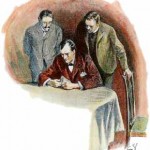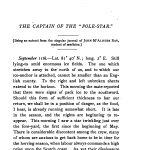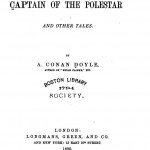“She’s in a terrible bad way,” the captain insisted. “You’ll have to do something before she can go.”
“What shall we have to do?”
“Dry dock her and give her a thorough overhaul. She might sink before she got out o’ the Channel if she went as she is just now.”
“Very well,” the merchant said coldly. “If you insist on it, it must be done. But, of course, it would make a great difference in your salary.”
“Eh?”
“You are at present getting fifteen pounds a month, and five per cent. commission. These are exceptional terms in consideration of any risk that you may run. We shall dry dock the Black Eagle, and your salary is now ten pounds a month and two and a half commission.”
“Belay, there, belay!” the sailor shouted. His coppery face was a shade darker than usual, and his bilious eyes had a venomous gleam in them. “Don’t you beat me down, curse you!” he hissed, advancing to the table and leaning his hands upon it while he pushed his angry face forward until it was within a foot of that of the merchant. “Don’t you try that game on, mate, for I am a free-born British seaman, and I am under the thumb of no man.”
“You’re drunk,” said the senior partner. “Sit down!”
“You’d reduce my screw, would ye?” roared Captain Hamilton Miggs, working himself into a fury. “Me that has worked for ye, and slaved for ye, and risked my life for ye. You try it on, guv’nor; just you try it on! Suppose I let out that little story o’ the painting out o’ the marks—where would the firm of Girdlestone be then! I guess you’d rather double my wage than have that yarn goin’ about.”
“What do you mean?”
“What do I mean? You don’t know what I mean, do you? Of course not.
It wasn’t you as set us on to go at night and paint out the Government
Plimsoll marks and then paint ’em in again higher up, so as to be able
to overload. That wasn’t you, was it?”
“Do you mean to assert that it was?”
“In course I do,” thundered the angry seaman.
The senior partner struck the gong which stood upon the table.
“Gilray,” he said quietly, “go out and bring in a policeman.”
Captain Hamilton Miggs seemed to be somewhat startled by this sudden move of his antagonist. “Steady your helm, governor,” he said. “What are ye up to now?”
“I’m going to give you in charge.”
“What for?”
“For intimidation and using threatening language, and endeavouring to extort money under false pretences.”
“There’s no witnesses,” the sailor said in a half-cringing, half-defiant manner.
“Oh yes, there are,” Ezra Girdlestone remarked, coming into the room. He had been standing between the two doors which led to the counting-house, and had overheard the latter portion of the conversation. “Don’t let me interrupt you. You were saying that you would blacken my father’s character unless he increased your salary.”
“I didn’t mean no harm,” said Captain Hamilton Miggs, glancing nervously from the one to the other. He had been fairly well known to the law in his younger days, and had no desire to renew the acquaintance.
“Who painted out those Plimsoll marks?” asked the merchant.
“It was me.”
“Did any one suggest it to you?”
“No.”
“Shall I send in the policeman, sir?” asked Gilray, opening the door.
“Ask him to wait for a moment,” Girdlestone answered.
“And now, captain, to return to the original point, shall we dry dock the Black Eagle and reduce the salary, or do you see your way to going back in her on the same terms?”
“I’ll go back and be damned to it!” said the captain recklessly, plunging his hands into the pockets of his pea jacket and plumping back into his chair.
“That’s right,” his grim employer remarked approvingly.
“But swearing is a most sinful practice. Send the policeman away,
Ezra.”
The young man went out with an amused smile, and the two were left together again.
“You’ll not be able to pass the Government inspector unless you do something to her,” the seaman said after a long pause, during which he brooded over his wrongs.






